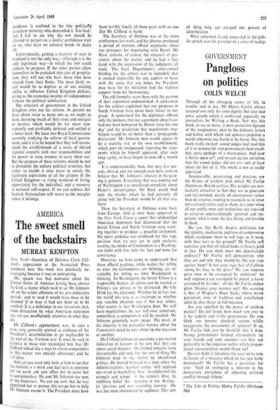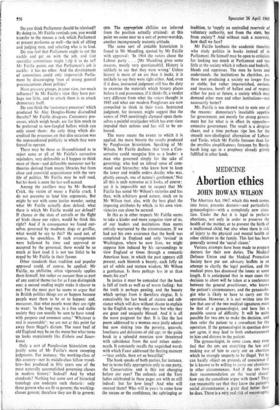Pangloss on politics
GOVERNMENT COLIN WELCH
Through all the changing scenes of life, in trouble and in joy, Mr Henry Fairlie always retained not only his own dignity but also that extra aureole which is conferred, especially on journalists, by Writing a Book. Nor was this book, as are so many, a mere protective figment of the imagination, akin to the delusory lovers and babies with which sad spinsters populate a world otherwise too harsh to be borne. No, this book really existed; sound judges had read bits of it in manuscript and pronounced them excel- lent, parts perhaps of a masterpiece. And now it bursts upon us*; and we can see for ourselves that the sound judges did not err—not at least about the bits of it. The whole is not so easily appraised.
Innumerable, penetrating and precious are the flashes of wisdom with which Mr Fairlie illuminates British politics. His insights are par- ticularly attractive in that they are so generous and fair-minded, nearly all constructive rather than destructive, tending to reconcile us to what miraculously exists and to show, at a time when all our public men and institutions are exposed to criticism unprecedentedly ignorant and im- patient, what is none the less fitting and lovable in them.
Do you, like Reith, despise politicians for the timidity, mediocrity and love of compromise which condemns them to roll logs, as it were, with their ears to the ground? Mr Fairlie will convince you that all which looks so base is gold in fact. Do you think most MPS depressingly ordinary? Mr Fairlie will demonstrate why they are and why they should be. Do you rage against them? Is not your rage that of Caliban seeing his face in the glass? Do you suppose great men to be corrupted by ambition? As well suppose a car corrupted by petrol, a horse corrupted by its rider : all this Mr Fairlie makes plain. Despise your masters not! His warning is that of Wagner's Hans Sachs, whose warm patriotism, love of tradition and conciliatory spirit he also shares in full measure.
Are you appalled by the power of modern parties? Do not forget how much you owe to it for orderly and stable government. Do you think our present electoral system wildly exaggerates the movements of opinion? If so, Mr Fairlie bids you be thankful that it does. Strong governments formed alternatively by your friends and your enemies—are they not preferable to the impotent welter which propor- tional representation would throw up?
Do you think it ridiculous for your MP to vote in favour of a measure which he has just hotly denounced? Mr Fairlie has a quotation for you: 'Such an ambiguity is inherent in the democratic procedure of adjusting political conflict through debate.'
• The Life of Politics Henry Fairlie (Methuen 36s) Do you think Parliament should be. televised? By doing so, Mr Fairlie reminds you, you would transfer to the masses a task which Parliament at present performs so well—the task of sifting and judging men, and selecting who is to lead.
Do you feel that Parliament ought to cut the cackle and get on with the job, and that specialist committees might help it to do so? Mr Fairlie points out that Parliament's job is cackle: it has no other. And the development of committees could only impoverish Parlia- ment by discouraging 'men of strong general preconceptions about politics.'
Have pressure groups, in your view, too much influence? In Mr Fairlie's view they have per- haps too little, and to attack them is to attack democracy itself.
Do you think the 'customary processes' which produced Sir Alec Douglas-Home discredited thereby? Mr Fairlie disagrees. Customary pro- cesses, which weigh heads, are for him much to be preferred to new-fangled ballots which can only count them : the only thing which dis- credited the processes on that dire occasion was the unprecedented publicity in which they were forced to operate.
There may be those so ill-conditioned as to reject some or all of Mr Fairlie's corrective rejoinders, very defensible as I happen to think most of them—and defensible moreover not by theories derived from musty libraries but from close and convivial acquaintance with the very life of politics. Mr Fairlie may be well read, but his book is none the less well named.
Among the cavillers may be Mr Bernard Crick, the victim of many a Fairlie crack. I do not presume to lend him arguments. But might he not with some justice wonder, seeing what Mr Fairlie actually does defend, what there is which Mr Fairlie would not defend? If chance or the state of entrails or the flight of birds chose our rulers, would he think this right? And if in consequence we found our- selves governed by madmen, dogs or gorillas, what would he say to this? He need not, of course, be speechless. If such arrangements were hallowed by time and approved or accepted by the governed, there would be so much at least (and it is not too little) to be urged by Mr Fairlie in their favour.
Other standards than tradition and popular approval could, of course, be applied; Mr Fairlie, no philistine. often vigorously applies them himself, but rather en passant than as part of any central theme (so far as I can distinguish one a second reading might make it clearer to me). For the most part he seems to argue that in British politics things are or happen because people want them to be or to happen; and, moreover, that what people want they are right to want: 'in the long run, in a free and stable society they can usually be seen to have voted with purpose and common sense.' Whatever is real is reasonable': we are not at this point far away from Hegel's dictum. The roast beef of old England may be on the menu but what turns up looks suspiciously like Eisbein and Sauer- kraut.
Only a sort of Panglossian historicism can justify some of Mr Fairlie's more sweeping judgments. For instance, 'the working-class of this country—not its middle-class fellow travel- lers—has produced in fifty years one of the most naturally accomplished governing classes in modern history.' Indeed? And by what standards? Nothing but some sort of historical tautology can underpin such rhetoric: only those govern who are fit to govern; the working- classes govern; therefore they are fit to govern; QED. The appropriate abilities are inferred from the position actually attained: at this point we come near to a sort of power-worship, another incongruously teutonic attitude.
The same sort of amiable historicism is found in Mr Maudling, quoted by Mr Fairlie with approval : 'In 1964 the voters chose the Labour party . . . [Mr Maudling gives some reasons, mostly very questionable]. History is unlikely to say that they were wrong: Unless history is more of an ass than it looks, it is unlikely to say they were right either. And, even if it does, instructed judgment still has the duty to examine the materials which history places before it and pronounce, if it thinks fit, a verdict very different from what the voters thought in 1945 and what our modern Panglosses are now compelled to think in their -train. Instructed judgment, for instance, might suggest that the voters of 1945 unwittingly clamped upon them- selves a painful straitjacket which has ever since impeded their actions and has still to be un- loosed.
The more recent the events to which it is applied, the more bizarre the results produced by Panglossian historicism. Speaking of Mr Wilson, Mr Fairlie declares that 'even a Con- servative could recognise him as a leader: a man who governed simply for the sake of governing; who had an inbred sense of com- mand and hierarchy; who knew how to keep the lower and middle orders docile; who was, plainly enough, one of nature's gentlemen.' Not all this is such nonsense as it looks, of course: yet it is impossible not to suspect that Mr Fairlie has noted Mr Wilson's victories and has then, with arbitrary good nature, stuck on to Mr Wilson (not, alas, with the best glue) the imposing attributes by which, in his own view, victories can alone be secured.
In this as in other respects Mr Fairlie seems to take a kinder and more sanguine view of us, of our leaders and institutions than seems entirely warranted by the circumstances. If we had not his own assurance that the book was completed in England and only 'revised' in Washington, where he now lives, we might suppose him induced by his surroundings to view England at times through a romantic American haze, in which the past appears still present, each blemish a beauty, each folly an act of subtle and mature wisdom, Mr Wilson a gentleman. Is there perhaps less in us than meets his eye?
In justice it must be conceded that the book is full of truth as well as of warm feeling: but the truth is perhaps passing, and the beauty which -springs from it therefore elegiac. It is conceivably the last book of stature and sub- stance which will dare without shame to explain to the English not why they were but why they are great and uniquely blessed. And it is all the more poignant for that. It is like the last poem addressed to a woman once justly adored but now sinking into the poverty, quarrels, loneliness and delusions of old age; or the guide book to a splendid mansion now threatened with subsidence from the coal mines under- neath. It constantly recalls the anguished words with which Faust addressed the fleeting moment —'stay awhile, thou art so beautiful.'
The book speaks of both parties, for instance, but in terms fully appropriate only to one party, the Conservative, and is this not changing before our eyes? The colonels and the Tory ladies celebrated in these pages are with us still indeed: but for how long? And who will succeed them? Who will in years to come have the means or The confidence, the upbringing or
tradition, to 'supply an unrivalled reservoir of voluntary authority, not from the state, but from society'? And without such a reservoir, how shall we fare?
Mr Fairlie lambasts the academic theorists who study politics in books instead of in Parliament. He himself may be open to criticism for looking too much at Parliament and too little at the society which it reflects and bedevils. bleeds and oppresses. The men he loves and understands, the institutions he cherishes, are these not producing a society no longer free or stable, but rather impoverished, envious and insecure, bereft of ballast and of respect either for past or future, a society which may demand other men and other institutions—not necessarily better?
Mr. Fairlie is too shrewd not to note one of the reasons: democracy's insatiable appetite for governMent, not merely for strong goiern- ment but for what is in effect its opposite— extensive governMent. The result is a dirigiste Chaos, and a time perhaps. ripe less for the smooth non-ideological alternation of Labour and Tories which Mr Fairlie foresees than for the terribles sinrplificafeurs foreseen by Burck- hardt long ago in a prciPhecy already grimly filfilled in other lands.







































 Previous page
Previous page